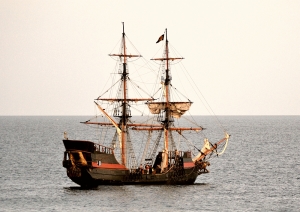
Image credit: Robert Pittman
The alien ships arrive without warning. In a moment, a civilisation we have developed over centuries is changed forever. Their technologies are beyond our comprehension, their language is strange and their motivations unclear. What will become of us?
It’s a frightening prospect, but one already faced by thousands of people just a few centuries ago. For the aliens here were Europeans arriving in the New World from across the sea, though they might as well have come from outer space. Why were the technologies they brought so novel, and the clashing cultures so different?
No observer surveying the Earth two hundred thousand years ago, when Anatomically Modern Humans evolved from a more archaic form of Homo sapiens, would have predicted that one day Europe would be the technological pinnacle of human societies. Africa, after all, was humanity’s cradle. Moving on to fifty thousand years ago, it was the ancestors of the aboriginal Australians who were most culturally advanced: not only had they traveled further than any others, they also had the ingenuity to create the first stone tools and paintings and also to begin to exploit nature using fire and primitive cultivation. At that time, humans had yet to set foot in Europe and the Americas. Eight thousand years ago, the ‘fertile crescent’ in the Middle East formed the human hot-spot from where modern farming began to spread, and even as recently as 1000 AD China was the brightest jewel on humanity’s technological crown.
Why, then, was it from Europe that explorers set out from the late fifteenth century onwards to discover, conquer and ultimately ‘globalise’ the world? Why are English and Spanish the world’s ‘lingua francas’, rather than Chinese, South American or African tongues? The industrial and agricultural revolutions gave Europe a clear technological advantage, but why did they take place there? Were a mixture of purely social and biological differences between ‘races’ at play, or was it ‘environmental determinism’ that made Europe the centre of the first global empires?
The racial hypothesis that would have been put forward by many imperialists themselves is now completely discredited: the very concept of ‘race’ is fundamentally fictitious, and Europeans are certainly no more intelligent or versatile than peoples from anywhere else. But they do possess key environmental advantages. For example, while native African, Australasian and American animals are generally too fierce or independent to tame, Eurasia contained horses to supplement man’s strength and herd animals such as sheep that could be easily controlled. Living in close proximity to these in turn meant that humans caught – and became gradually immune to – all sorts of diseases. Meanwhile, a lack of natural barriers to information flow through Eurasia meant that great technological strides could be made relatively rapidly over the past few millennia. This all meant that Europeans could carry a horse- then steam-driven civilisation to all corners of the world, and that it was European animal-derived diseases that killed off vanquished natives, who had no immune protection, not the other way around.
But don’t begin to believe that human history was solely determined by the environment; there must have been some social impetus behind the last few centuries’ explosion of science, technology and zeal for exploration in Europe. Indeed, a vying for pre-eminence amongst different European imperial powers must have differentiated them from unified China: whilst European countries drove each other towards new horizons, taking full advantage of a similarly beneficial environment was prevented in China by the conservative attitude of stand-alone emperors who wanted to maintain the status quo. Yet it is clear that the environment, which determines every species’ biology, in the long-term does also shape society, a notion, in a world where regional environments are rapidly changing, that is well-worth bearing in mind.
![The Magic Environment The alien ships arrive without warning. In a moment, a civilisation we have developed over centuries is changed forever. Their technologies are beyond our […]](/wp-content/uploads/2014/12/Ship-640x361.jpg)